Tank Soldier Does It Again Richmond Va
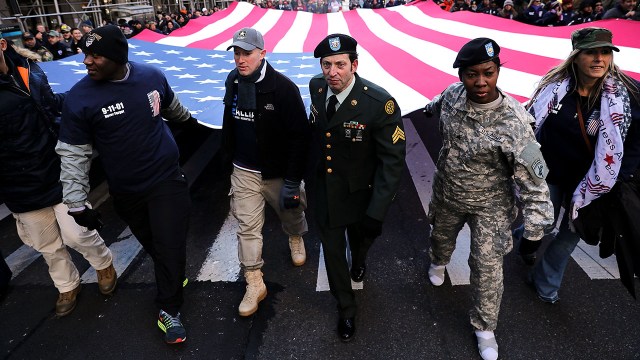
This Veterans Twenty-four hours, Americans across the country will honour the service and sacrifice of U.Due south. military veterans. A recent Pew Research Center survey of veterans found that, for many who served in gainsay, their experiences strengthened them personally but also made the transition to civilian life hard.
Hither are key facts nearly veterans, fatigued from that survey:
1 The experiences of post-nine/xi veterans differ from those who served in previous eras. About one-in-five veterans today served on active duty later on the terrorist attacks of Sept. 11, 2001. These mail-9/eleven veterans are more likely to accept been deployed and to accept served in gainsay, giving them a distinct set of experiences compared with those who served in previous eras.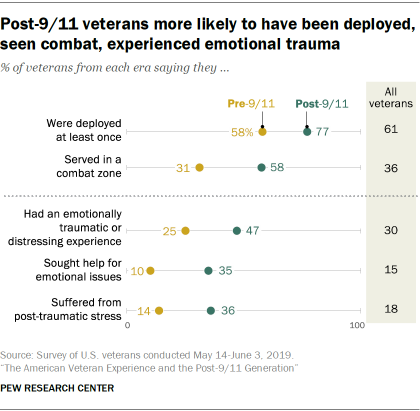
Post-nine/11 veterans are besides more likely than their predecessors to bear some of the physical and psychological scars of combat. Roughly half (47%) of post-nine/11 veterans say they had emotionally traumatic or distressing experiences related to their war machine service, compared with 1-quarter of pre-9/11 veterans. About a third (35%) of mail service-9/11 veterans say they sought professional assist to bargain with those experiences, and a similar share say that – regardless of whether they have sought help – they remember they have suffered from post-traumatic stress (PTS).
2 A majority of veterans say they accept felt proud of their service since leaving the military. Roughly two-thirds of all veterans (68%) say, in the showtime few years after leaving the military machine, they oft felt proud of their military service. An additional 22% say they sometimes felt proud, and 9% say they seldom or never felt this way. Pre-9/eleven veterans are more likely to say they frequently felt proud of their service than are post-9/11 veterans (70% vs. 58%).
Most veterans say they would endorse the military equally a career choice. Roughly eight-in-ten (79%) say they would advise a young person close to them to bring together the armed forces. This includes large majorities of postal service-nine/11 veterans, combat veterans and those who say they had emotionally traumatic experiences in the military.
three More veterans say the military did a skillful job preparing them for life in the service than it did in readying them for the transition to civilian life. 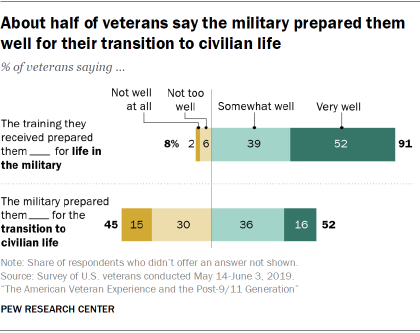 Veterans across eras offer similarly positive evaluations of the job the military did preparing them for military life, but less then when it comes to the return to noncombatant life. Roughly nine-in-ten veterans (91%) say the training they received when they start entered the military prepared them very or somewhat well for military life. Past dissimilarity, about half (52%) say the military prepared them very or somewhat well for the transition to noncombatant life.
Veterans across eras offer similarly positive evaluations of the job the military did preparing them for military life, but less then when it comes to the return to noncombatant life. Roughly nine-in-ten veterans (91%) say the training they received when they start entered the military prepared them very or somewhat well for military life. Past dissimilarity, about half (52%) say the military prepared them very or somewhat well for the transition to noncombatant life.
4 About half of post-ix/11 veterans say readjusting to civilian life was difficult. While about three-quarters of all veterans (73%) say readjusting to civilian life was very or somewhat easy, roughly one-in-4 (26%) say it was at least somewhat difficult. 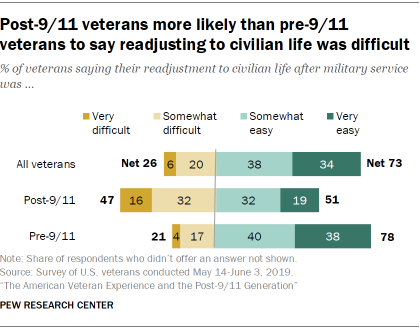 There is a significant gap between pre- and postal service-9/11 veterans in this regard. Nigh half of mail service-nine/xi veterans (47%) say it was very or somewhat hard for them to readjust to civilian life afterwards their military service. By comparison, only about one-in-five veterans whose service ended before 9/11 (21%) say their transition was very or somewhat difficult. A large majority of pre-9/eleven veterans (78%) say it was easy for them to make the transition.
There is a significant gap between pre- and postal service-9/11 veterans in this regard. Nigh half of mail service-nine/xi veterans (47%) say it was very or somewhat hard for them to readjust to civilian life afterwards their military service. By comparison, only about one-in-five veterans whose service ended before 9/11 (21%) say their transition was very or somewhat difficult. A large majority of pre-9/eleven veterans (78%) say it was easy for them to make the transition.
v For many veterans, the imprints of war are felt across their tour of duty. The challenges some veterans face during the transition to civilian life can be fiscal, emotional and professional. 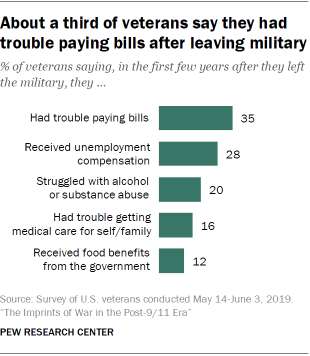 Well-nigh a third of veterans (35%) say they had trouble paying their bills in their first few years after leaving the military, and roughly three-in-ten (28%) say they received unemployment compensation. One-in-5 say they struggled with booze or substance abuse.
Well-nigh a third of veterans (35%) say they had trouble paying their bills in their first few years after leaving the military, and roughly three-in-ten (28%) say they received unemployment compensation. One-in-5 say they struggled with booze or substance abuse.
Veterans who say they have suffered from PTS are much more probable to report experiencing these things than those who did not. Roughly six-in-x (61%) say they had trouble paying their bills, about four-in-10 (42%) say they had trouble getting medical care for themselves or their families, and a similar share (41%) say they struggled with alcohol or substance abuse.
half-dozen When it comes to employment, a majority of veterans say their military service was useful in giving them the skills and grooming they needed for a civilian job. Almost one-in-3 veterans (29%) say information technology was very useful, and another 29% say information technology was adequately useful. There are significant differences past rank: While 78% of veterans who served every bit commissioned officers say their war machine service was useful, smaller shares of those who were noncommissioned officers (59%) or enlisted (54%) say the same.
Most mail service-ix/11 veterans say having served in the military machine was an advantage when it came to finding their showtime post-military chore – 35% say this helped a lot and 26% say it helped a little. But about 1-in-ten (9%) say having served in the war machine hurt their ability to get a job. Amid veterans who looked for a job after leaving the military, 57% say they found one in less than 6 months, and an additional 21% say they had a chore in less than a yr.
7 Veterans give the VA mixed reviews. 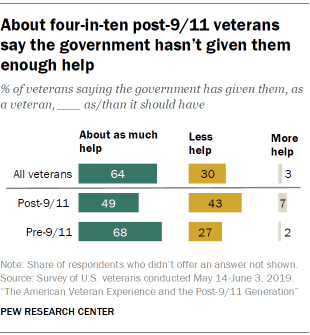 Most veterans (73%) say they have received benefits from the Department of Veterans Affairs. When asked to assess the job the VA is doing in meeting the needs of veterans, fewer than half (46%) of all veterans say the VA is doing an excellent or skillful task in this regard.
Most veterans (73%) say they have received benefits from the Department of Veterans Affairs. When asked to assess the job the VA is doing in meeting the needs of veterans, fewer than half (46%) of all veterans say the VA is doing an excellent or skillful task in this regard.
More broadly, 64% of veterans say the authorities has given them almost as much aid as it should have. Iii-in-10 say the government has given them too little help. Mail service-9/eleven veterans are more likely than those from previous eras to say the government has given them less help than information technology should have (43% vs. 27%).
8 Majorities of veterans say the wars in Iraq and Transitional islamic state of afghanistan were not worth fighting. Additional findings from the same survey show that about ii-thirds of veterans (64%) say they think the war in Iraq was not worth fighting considering the costs versus the benefits to the U.s.a., while 33% say it was. Similarly, a bulk of veterans (58%) say the war in Afghanistan was not worth fighting. About four-in-ten (38%) say information technology was worth fighting.
Views differ significantly by party. Republican and Republican-leaning veterans are much more probable than veterans who identify with or lean toward the Democratic Party to say the wars in Iraq and Afghanistan were worth fighting: 45% of Republican veterans vs. 15% of Democratic veterans say the war in Republic of iraq was worth fighting, while 46% of Republican veterans and 26% of Democratic veterans say the same near Afghanistan.
Views on U.S. military date in Syria are too more negative than positive. Amongst veterans, 42% say the campaign in Syrian arab republic has been worth it, while 55% say it has not. (The survey was conducted entirely before President Donald Trump's decision to remove U.Southward. troops from parts of Syria.)
9 A majority of Americans and veterans associate subject and patriotism with veterans. Majorities among veterans (61%) and the full general public (64%) say most Americans look up to people who have served in the military. And veterans meet themselves every bit more disciplined (84%) and patriotic (71%) than those who have not served in the armed services. Most Americans hold with this: 67% of all adults say being disciplined meliorate describes veterans than non-veterans, and 59% say the same about being patriotic.
Well-nigh a third or more among veterans and the public say veterans are more hard-working than those who haven't served. Nonetheless, when it comes to things like being tolerant and open up to all groups, the public is less likely to meet this every bit a trait associated with military service than veterans are themselves.
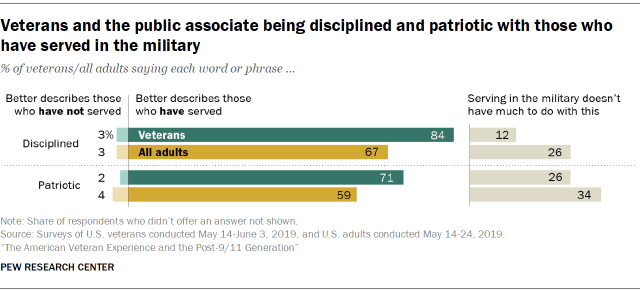 Annotation: See full topline results and methodology.
Annotation: See full topline results and methodology.
stallingsloord1997.blogspot.com
Source: https://www.pewresearch.org/fact-tank/2019/11/07/key-findings-about-americas-military-veterans/
0 Response to "Tank Soldier Does It Again Richmond Va"
Postar um comentário